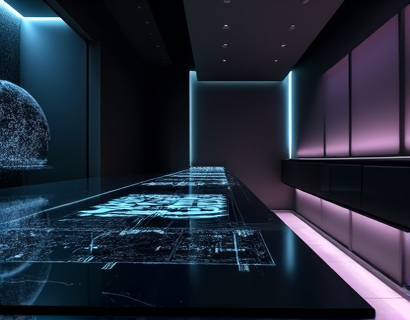Transform Architecture Firm Management: Leveraging Advanced Software for Enhanced Efficiency and Collaboration
In the dynamic and competitive world of architecture, firms are constantly seeking ways to enhance their operational efficiency and foster better collaboration among team members. The integration of advanced software solutions has emerged as a pivotal strategy to transform firm management, allowing architects to concentrate on their creative endeavors while optimizing project management, resource allocation, and client interactions. This transformation not only boosts productivity but also ensures that architecture firms remain agile and responsive to the evolving demands of the industry.
The Need for Advanced Software in Architecture Firm Management
The architecture industry is characterized by complex projects, tight deadlines, and multifaceted client requirements. Traditional management practices often struggle to keep pace with these demands, leading to inefficiencies and potential bottlenecks. Advanced software solutions are designed to address these challenges by providing comprehensive tools that streamline various aspects of firm management. These tools enable architecture firms to manage projects more effectively, allocate resources optimally, and maintain seamless communication with clients and team members.
Key Features of Advanced Software for Architecture Firms
Advanced software solutions for architecture firms come equipped with a range of features that cater to the specific needs of the industry. Some of the key features include:
- Project Management: Comprehensive tools for planning, executing, and monitoring projects from start to finish.
- Resource Allocation: Intelligent systems for assigning tasks and managing resources based on availability and expertise.
- Collaboration Platforms: Integrated environments for team members to collaborate in real-time, share files, and communicate effectively.
- Client Management: Robust systems for managing client interactions, tracking progress, and ensuring satisfaction.
- Reporting and Analytics: Detailed insights and reports to help make informed decisions and measure performance.
These features collectively contribute to a more organized, efficient, and collaborative work environment, allowing architecture firms to deliver high-quality projects consistently.
Enhancing Project Management with Advanced Software
Project management is a critical component of any architecture firm's success. Advanced software solutions offer powerful tools to streamline project management processes. These tools enable firms to create detailed project plans, set milestones, and assign tasks to team members with precision. Real-time tracking and monitoring features ensure that projects stay on schedule and within budget. Additionally, integrated change management functionalities allow for smooth adjustments to project scope and timelines, minimizing disruptions and maintaining client satisfaction.
One of the significant benefits of using advanced project management software is the reduction of manual paperwork and the associated errors. Digital workflows automate routine tasks, freeing up time for team members to focus on more value-adding activities. This shift not only enhances efficiency but also reduces the risk of human error, leading to higher-quality project deliveries.
Optimizing Resource Allocation
Effective resource allocation is crucial for the smooth operation of an architecture firm. Advanced software solutions provide intelligent algorithms and data-driven insights to optimize resource allocation. These systems consider factors such as team members' availability, skill sets, and current workload to assign tasks efficiently. This ensures that the right people are working on the right tasks at the right time, maximizing productivity and minimizing delays.
Moreover, resource allocation software can predict future resource needs based on historical data and project trends. This forward-looking approach helps firms prepare for upcoming projects and avoid potential bottlenecks. By optimizing resource allocation, architecture firms can reduce costs, improve project outcomes, and enhance overall operational efficiency.
Facilitating Seamless Collaboration
Collaboration is at the heart of successful architecture projects. Advanced software solutions create integrated collaboration platforms that bring team members together in a centralized environment. These platforms support real-time communication, file sharing, and joint document editing, ensuring that everyone is on the same page throughout the project lifecycle.
One of the most significant advantages of these collaboration tools is the elimination of silos within the firm. Architects, engineers, project managers, and other stakeholders can work together seamlessly, sharing insights and feedback in real-time. This level of collaboration not only accelerates the decision-making process but also fosters a culture of innovation and creativity.
Furthermore, advanced collaboration platforms often include features such as task assignments, progress tracking, and notification systems. These functionalities ensure that all team members are aware of their responsibilities and deadlines, reducing the likelihood of miscommunication and missed deadlines.
Improving Client Interactions
Client satisfaction is a key indicator of an architecture firm's success. Advanced software solutions enhance client interactions by providing comprehensive tools for managing client relationships. These tools enable firms to maintain detailed client profiles, track communication history, and manage project deliverables effectively.
One of the most valuable features is the ability to provide clients with real-time access to project progress. Through secure portals and dashboards, clients can view updates, review documents, and provide feedback without needing to involve the firm's internal processes. This transparency builds trust and ensures that clients feel engaged and informed throughout the project.
Additionally, advanced client management software includes features for scheduling meetings, sending reminders, and automating follow-ups. These functionalities help firms maintain a high level of service and responsiveness, further enhancing client satisfaction and loyalty.
Boosting Productivity through Automation
Automation is a cornerstone of advanced software solutions for architecture firms. By automating routine and repetitive tasks, firms can significantly boost productivity. Automation tools can handle a wide range of tasks, from data entry and report generation to task assignments and status updates. This not only saves time but also reduces the risk of human error, ensuring that processes are executed consistently and accurately.
For instance, automation can streamline the invoicing and payment processing workflow, reducing the administrative burden on the firm's finance team. Automated reminders and notifications ensure that invoices are sent on time, and payments are tracked efficiently. This level of automation not only improves financial management but also enhances the overall client experience by providing timely and accurate billing information.
Scalability and Flexibility
As architecture firms grow and evolve, their management needs change accordingly. Advanced software solutions are designed to be scalable and flexible, adapting to the firm's growth and evolving requirements. Whether a firm is expanding its team, taking on more complex projects, or entering new markets, the software can scale to meet these challenges without compromising performance.
Scalability ensures that firms can add new features and functionalities as needed, without the need for extensive reconfiguration or additional investments. This flexibility allows firms to stay agile and responsive, maintaining a competitive edge in the industry.
Enhancing Security and Compliance
Security and compliance are paramount in the architecture industry, given the sensitive nature of project data and client information. Advanced software solutions prioritize data security by implementing robust encryption, access controls, and regular security audits. These measures ensure that client data and project information are protected from unauthorized access and breaches.
Moreover, compliance with industry standards and regulations is automatically managed by the software. Features such as audit trails, reporting, and compliance checks help firms stay compliant with relevant laws and regulations, reducing the risk of legal issues and reputational damage.
Case Studies and Success Stories
Several architecture firms have successfully implemented advanced software solutions, resulting in significant improvements in efficiency and collaboration. For example, a mid-sized firm in New York leveraged a comprehensive project management platform to streamline their workflows. Within six months, they reported a 30% reduction in project delays and a 25% increase in client satisfaction scores. The firm's project managers praised the platform's intuitive interface and powerful features, which enabled them to manage complex projects more effectively.
Another firm in London utilized an advanced collaboration tool to enhance team communication and file sharing. The firm observed a 40% reduction in internal communication errors and a 20% increase in project completion speed. Team members appreciated the real-time collaboration features, which fostered a more cohesive and productive work environment.
These success stories underscore the tangible benefits of adopting advanced software solutions in architecture firms. By leveraging these tools, firms can achieve higher levels of efficiency, collaboration, and client satisfaction, ultimately driving business growth and success.
Conclusion
The integration of advanced software solutions in architecture firm management represents a transformative shift towards greater efficiency, collaboration, and productivity. By automating routine tasks, optimizing resource allocation, and enhancing client interactions, these tools enable architects to focus on their creative endeavors with confidence. As the industry continues to evolve, embracing these technological advancements will be crucial for architecture firms aiming to stay competitive and deliver exceptional results.










































